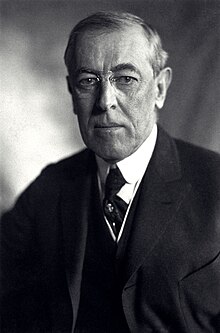📖 Presidential Profile
Comprehensive overview of leadership, policies, and historical significance
📋 Biography & Political Journey
The Academic President and Progressive Reformer
Thomas Woodrow Wilson brought a unique intellectual perspective to the presidency as the only **president with a Ph.D.** and extensive experience as a university professor and president of Princeton University. His academic background in political science and history informed his approach to governance and his belief in the power of ideas to shape politics. Wilson’s **New Freedom** domestic agenda aimed to restore competition and reduce the power of big business through antitrust legislation, banking reform, and tariff reduction. The creation of the **Federal Reserve System** and passage of the Clayton Antitrust Act represented major achievements of progressive reform.
World War I and Reluctant Leadership
Wilson initially tried to keep America neutral in World War I, winning re-election in 1916 on the slogan **”He Kept Us Out of War.”** However, German submarine warfare and the Zimmermann Telegram ultimately forced his hand, and he asked Congress for a declaration of war in April 1917, declaring that “the world must be made safe for democracy.” Wilson’s **”Fourteen Points”** outlined his vision for post-war peace based on self-determination, free trade, and international cooperation. His leadership during the war mobilized American industry and society for total war effort.
The League of Nations and International Idealism
Wilson’s greatest aspiration was the creation of the **League of Nations** as an international organization to prevent future wars through collective security and peaceful dispute resolution. His personal participation in the Paris Peace Conference made him the first sitting president to travel to Europe on official business. Wilson’s idealistic vision for international cooperation represented a fundamental departure from American isolationism, though his rigid approach to negotiations and unwillingness to compromise on the League’s charter would ultimately contribute to its failure in the U.S. Senate.
The Senate Fight and Stroke Controversy
Wilson’s refusal to compromise with Senate Republicans on **League of Nations membership** led to one of the greatest constitutional crises in American history. His decision to take his case directly to the American people through a grueling national speaking tour demonstrated his faith in public opinion but ignored political realities in Washington. When Wilson suffered a **severe stroke** in October 1919, his wife Edith effectively became acting president, controlling access to Wilson and making many decisions in his name. The extent of Wilson’s incapacity was hidden from Congress and the public, raising serious questions about presidential succession and the 25th Amendment.
The Presidential Sheep Lawn
During World War I, Wilson decided to demonstrate patriotic sacrifice by **keeping a flock of sheep on the White House lawn** instead of paying for groundskeeping, with the wool to be auctioned for the Red Cross. The sheep, led by a tobacco-chewing ram named **”Old Ike,”** became a tourist attraction but also a source of embarrassment when they ate the White House flower beds and **chased visitors around the grounds**. The situation became so problematic that Secret Service agents had to learn basic sheep herding, and Wilson eventually had to hire professional shepherds when Old Ike became increasingly aggressive and began **charging at Cabinet members** during outdoor meetings. The sheep raised $52,823 for charity, but the experiment was quietly ended after the war.
Humor & Jokes
Wilson's Idealism
Wilson was so idealistic, he thought he could make the world safe for democracy. Adorable,…
Read More →Greatest Wins
🏦 Establishment of the Federal Reserve System
Wilson created America's central banking system in 1913, providing crucial financial stability and monetary policy…
Read More →Epic Fails
🏛️ Segregation of Federal Workforce
Wilson reversed decades of progress by segregating federal offices, devastating Black civil servants and institutionalizing…
Read More →